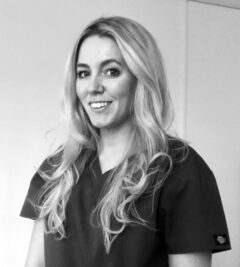This is the first step to a healthy mouth. The Dentist will check your gums, teeth, tongue and jaw to make sure that each area is healthy. You and your dentist can discuss the results and plan the best way to deal with any problems. A recall interval will be set ranging from three to twenty-four months.
Services
-
Dental Examination
What is it?
What will my Dentist do?
As well as looking in your mouth, the dentist will advise you on the following:
- Any problems you’ve noticed (such as pain or sensitivity)
- Your diet (sugary snacks and drinks can cause tooth decay)
- How you clean your teeth (correct cleaning helps prevent decay and gum disease)
- Smoking and drinking (both can harm your mouth)
An examination will include the following:
- Look at your face and neck to see that they are healthy
- Feel under your jaw
- Look inside your mouth, at your tongue, the roof of your mouth and the back of your throat
- Look at your teeth and gums for signs of decay, damage or gum disease (for children, your dentist will also look at tooth and jaw development in case orthodontic treatment is needed)
- Compare your mouth now with how it was when they last saw you
- Decide whether more information is needed taking x-rays if indicated
- Tell you about any treatment needed, explaining the choices and whether there will be any cost
*The examinations may take longer if you are seeing a new dentist for the first time
What are the benefits?
- Regular examinations mean that your dentist can spot problems and correct them early before the treatment becomes complicated
- Regular examinations allow a risk assessment of your oral health to be done informing you and allowing you to try and improve your chance of a healthy mouth
-
Preventative and Minimal Invasive Dentistry
At Bax Dental our main aim is to reduce the risk of dental decay, gum disease and other health issues. As we get to know you, we build a picture of your risks and possible problems you could face in the future. We will help guide you away from the need of fillings and extractions, to keep your smile looking healthy. The best tooth is an unrestored one. Following advice from our team should in the long term reduce costs and treatment visits to us.
Routine visits to Bax Dental help us reinforce and monitor the prevention side of your dental health. If problems do occur it lets us act early using well practiced minimal invasive techniques.
Minimal Invasive Dentistry
Minimal intervention dentistry is the holistic patient care philosophy that encompasses the complete patient dentist team-care approach to manage dental disease by identification and diagnosis, prevention and control, restoration and recall, through educating and empowering the patient to take responsibility for their personal oral health.
Attending your Dental appointments regularly, should lead to less treatment and avoid larger fillings or worse extractions. If problems are caught early then minimal invasive techniques can be used to save your smile, preserving as much of the natural tooth as possible whilst producing healthy and cosmetic results.
-
Dental Implants

Treatment with dental implants has provided patients with a proven option to replace missing teeth for many years. Developments in the materials and techniques used have now made them the gold-standard for tooth replacement, and they avoid many risks and disadvantages of alternatives such as bridges and dentures.
Our implant team consists of two dentists Craig Jack and Gavin McManuns. They have known each other since they were clinical partners at Manchester Dental School. Along side the Bax Dental support team they can offer you a comprehensive service, from a single tooth replacement to full mouth rehabilitation.
We are taking referrals from local dentists through to self-referrals from patients. Once treatment is complete your dentist will be provided with full details on treatment completed and future maintenance requirements.
Craig Jack was awarded a Masters Degree in Prosthodontics in 2010 and is actively involved in the teaching of postgraduate students as well as lecturing across the North West. His experience should allow you the best possible outcome for your smile.
Gavin McManus undertook training in implant dentistry with the Centre for Advanced Dental Education and extended his skills by successfully completing the gold standard of implant diplomas with the Faculty of General Dental Practitioners and the Royal College of Surgeons. He has recently co-authored a journal article on implant dentistry for the British Dental Journal. His practice is now limited to Oral surgery and Implant dentistry.
Craig will be providing your treatment plan and restoring your smile once the implants have been placed and had time to settle. He can also provide treatment to complete your smile where we have been able to maintain your natural dentition, or provide a treatment plan for your dentist to complete your case.
Gavin will be expertly placing dental implants and providing the surgical side of your treatment, to ensure sound foundations on which your smile will be restored. He is able to offer sedation for nervous patients if needed.
Please contact reception or email if you have any questions. We look forward to meeting you and showing what is now possible with modern dental techniques.
What are Dental Implants?

A dental implant is made from titanium and resembles a small screw. Once placed, the surface of the implant interacts with the surrounding bone to form a strong bond and a natural looking artificial tooth (the crown) can then be connected to the implant.
When can Dental Implants be used?
Losing a tooth often leads to there being a visible gap between the other teeth which can be unsightly and upsetting. Conventional dentistry such as dental bridges involves drilling into adjacent teeth that may be perfectly healthy. Implants avoid the need to drill into any other teeth, and therefore avoid possible complications such as infection, fracture, and ultimately the loss of these teeth.
Dental implants can be used to replace a single missing tooth, multiple teeth, or all teeth.
In patients who have no natural teeth left, dental implants can be particularly useful to provide extra anchorage for removable dentures. This can be of great benefit when there is not much natural bone remaining for a denture to “grip”, causing looseness, discomfort, and difficulty eating.
Treatment needs to be planned carefully however, and factors such as bone quality and quantity, tooth and jaw relationships, and general medical health may affect suitability for certain treatments.
How long does treatment take to complete?
Treatment consists of three phases – planning, surgical, and restorative. The surgical phase consists of a minor procedure to place to implant and often requires the use of a small amount of bone grafting if there is insufficient natural bone. After the implant has integrated with the bone, the new artificial teeth will be designed and constructed to fit over the implants.
Depending on the complexity of the case it may take between five and twelve months to complete treatment.
Referral Form
-
Hygienist Treatment and Fresh Breath Clinic

The hygienist visit is one of the most important parts of maintaining oral health. Bax Dental recommends patients see the Hygienist when indicated according to your risk assessment carried out at your check up. Some patients benefit from three monthly visits. Others can be recalled at twenty-four monthly intervals.
The hygienist will measure the gaps between gums and teeth with a rounded probe to explore whether any signs of gum disease is present and will undertake any treatment necessary to help prevent the disease from progressing.
The hygienist will advise on an oral hygiene routine specific to the individual, depending on various patient and risk factors. This is the most important part of your visit. It is vital that advice is followed and good habits with brushing, interdental cleaning and lifestyle adjustments are continued in between visits.
Fresh Breath
We are always conscious about keeping our breath smelling nice, and there are many products such as mints and mouth spray that exemplify this, however, these products generally only hide the smell rather than treat the actual cause of the bad breath.
Bad breath (Halitosis) can be caused by a number of things, but is normally associated with either the food we eat or bacteria that lives in our mouths – in particular on our tongue or the back of our mouth.
Causes of bad breath can also be attributed to medical conditions such as diabetes, or digestive system issues. People can be embarrassed to seek advice about the issues of bad breath. However, it is a common problem and as always we are here to help.
Our Hygienists provide care and education as well as thorough cleaning which will help the fight against bad breath. Regular hygiene appointments and correct brushing at home will help reduce gum disease and bad breath.
Our clinical team Jon, Shanella, Kate and Danielle have attended many postgraduate courses, which building on their clinical experience has helped many patients with different degrees of gum disease. We all routinely suffer from gingivitis (bleeding gums), early intervention, recall and review can help save issues later in life. If things do go wrong please see our leaflet for advice to help improve the condition of your gums. We work closely with a specialist colleague and may suggest a referral for advice or occasionally treatment.
-
Cosmetic Dentistry
At Bax Dental we will try to make your teeth feel and look as natural as possible if they need to be restored. There are certain limitations, where the most cosmetic option could damage your teeth more than necessary, and we would struggle to recommend this. Many of the newer minimal invasive techniques involve little or no damage to your dentition and teeth can be repaired quickly and are more cost effective than traditional crowns or porcelain veneers.
Composite Veneers
Following on with our natural minimal intervention approach to dentistry we have been offering composite build ups to help improve the appearance without causing unnecessary damage to the teeth and avoid costly treatment plans. This technique has many uses from simply closing a gap or masking a discoloured tooth through to full mouth rehabilitation in excessive tooth wear.
Often this treatment
- Can be done without local anaesthetic
- Can be repaired quickly and inexpensively
- Doesn’t damage the tooth further
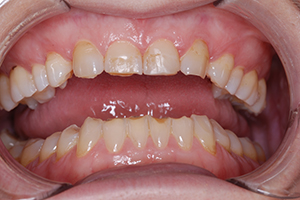
Before
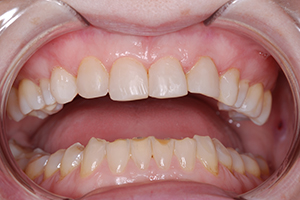
Upper teeth done
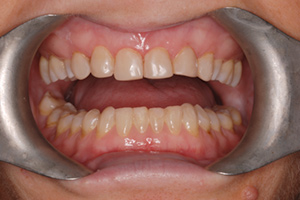
Lower teeth done
Minimal invasive techniques may not be suitable for everyone or if existing restorations fail, so at Bax Dental, we offer the full range of crowns, dentures and bridges.
-
Headaches and Jaw Problems
Anyone with persistent headaches should be examined by a dental or medical expert. We are pleased to have Shanella working with us, who is a specialist dentist in the TMJ clinic at Manchester Dental Hospital. She has been providing advice and treatment to our patients.
The joint between your jaws, just in front of your ears, is called the temporomandibular joint, but is known as ‘TMJ’ for short. The jaw joints are examined in a routine check-up and the dentist can help treat any symptoms arising from TMJ problems.
What are the symptoms?
- Clicking noises when you move your jaw
- Opening/closing of the mouth difficulties
- Swelling or soreness over the joint
- Pains in the face, neck or chewing muscles. In some people pain in the shoulders and back can occur
- Headaches or migraines, particularly when you first wake up
- Earache, possibly with ringing of the ears too
Clicking or grating noise problems can be solved by:
- Cutting up food into smaller pieces
- Avoiding particularly chewy or hard foods
- Avoiding opening your mouth too wide, particularly when yawning
Joint pain is usually due to the increased tension on the jaw muscles. Things that cause this include:
- Grinding and clenching teeth
- Habits such as chewing on a pen or biting your nails regularly
The above habits are often caused by fatigue and anxiety. Painkillers can relieve the problems on a short-term basis, but to solve the problems you can try:
- Using relaxation techniques
- Giving up the habits above (pen chewing etc.)
- Wearing a ‘biteguard’ during the night to lessen the grinding of the teeth in your sleep
Referral to specialist colleagues is occasionally needed.
-
Children's Dental Care
Here at Bax dental we take pride in helping children and young families to achieve good oral health.
Patients usually don’t know about the process of tooth decay or gum disease. The first thing to realise is that these are infectious diseases. Bacteria that live in our mouths cause tooth decay and gum disease, these can be passed from patient to patient. Prevention, routine monitoring, assessing risk and education on how to improve you and your child’s chances of a disease free mouth is our aim.
Children should come to the dentist as soon as possible. A good introduction is to bring them when you visit us. This allows them time to get accustomed to the surroundings. Each child is very different so we will be lead at their pace. Most children really enjoy visits to Bax dental.
We will guide when necessary using disclosing solution that will indicate where they are missing with their toothbrush. Discussions on diet and when to have sugar will be mentioned at every appointment. If things do change and new cavities develop a detailed diet analysis can be done with the family to highlight foods and drinks that can be increasing the risk of tooth decay.
When appropriate high fluoride varnishes and toothpastes can be prescribed to try and strengthen teeth. Along with a healthy diet and good oral hygiene the risks of disease decrease.
What is really important is that children feel we are here to help. A growing number of young adults who were toddlers when Jon first started treating them now have completely disease free mouths. Risk factors indicate that they now only need to see us every eighteen to twenty-four months. We are of course available if they need advice or a problem develops, usually with wisdom teeth at this age.
Please see an example below of how we managed a patient who had an accident snapping one of his adult front teeth. The patient was a regular attender at the practice, which made treating him very easy. Advanced materials used at the correct time have stopped him needing root canal treatment at this age and hopefully saved his tooth for many years to come.

This shows the patient tooth treated with biodentine and a temporary white filling.

Fractured portion of tooth prepared ready to stick back into mouth.

Temporary filling removed with tooth prepared to have fractured portion reattached.

Tooth fixed. There is still risk of it breaking again or the nerve dying at a later date.

View from back of mouth.

Treatment complete.
-
Facial Aesthetics
We are working on this page. For more information in the meantime please contact us on 01625 613322.
-
Guided Biofilm Therapy (GBT) Airflow™
What is Guided Biofilm Therapy (GBT)?
GBT is a new state of the art treatment that removes ‘biofilm’ from teeth & gums. We are moving away from traditional methods of scaling and polishing teeth as a treatment for gum disease and over to the much more effective and minimally invasive therapy which is now the gold standard.
We offer Guided Biofilm Therapy here at Bax Dental, a treatment protocol devised and used by leading gum specialists throughout the world.
What is Biofilm?
Biofilm is more commonly known as dental plaque, it is a group of micro- organisms which stick together and adhere to the tooth surface of the teeth. Biofilm contains bacteria which is both damaging to our teeth & gums. This biofilm can lead to caries, periodontal disease and peri-implantitis. There is evidence that severe gum disease (periodontitis) can increase the risk of systemic disease such as cardiovascular disease, diabetes, strokes and dementia.
How is Airflow used?
Guided Biofilm Therapy now treats gum disease by targeting disease causing bacteria by using a dye to stain the biofilm in the patient’s mouth. When the biofilm is identified, a warm water flushing system called ‘Airflow’ with a bactericidal powder is used to kill and remove the plaque in your mouth and prolong the time it takes to grow back.
The Airflow system also easily and gently removes unsightly stains that may be caused by tea, coffee, smoking and dietary factors leaving your teeth looking whiter, polished, and feeling super smooth.
The second part to the treatment uses an ultrasonic scaler, which is incredibly gentle and effortlessly removes calculus (tartar) from your teeth without sensitivity.
The whole system has been designed for comfort and uses heated water to prevent tooth sensitivity.
You’ll find it comfortable, efficient and will see the results for yourself!
Finally, we apply a special strengthening cream to your enamel at the end of your treatment that applies essential nutrients to your tooth surface to keep it in optimal health.
There are many benefits to having GBT:
- GBT aims to reduce the amount and stop the regrowth of dental biofilm.
- It acts under the gum margin and helps to treat periodontal disease.
- It can be used safely around restorations, crowns, bridges, orthodontic appliances and is excellent for cleaning around dental implants.
- It removes staining reducing the need for more abrasive polishing systems.
- GBT can be safely used on children to help them improve their oral health.
Your dentist or hygienist will advise you of the best treatment options for you. Please do not hesitate to ask for further information.
-
Invisalign®

What is Invisalign®?
Invisalign is a world-renowned teeth straightening system that uses custom fit clear aligners which are comfortable and non-invasive to move teeth gradually and gently into a desired orthodontic position.
What are the benefits?
Invisalign use a series of virtually invisible aligners to achieve your dream smile – this means you can continue living your normal day to day life with minimal change during your treatment.
Invisalign is a clinically proven effective option to fix a range of orthodontic issues such as, crowding, open bite, underbite/overbite, cross bites, and gaps between teeth; therefore, not only does Invisalign achieve aesthetically pleasing results, but it can also help improve your bite function and aid your overall oral hygiene as well.
We use state of the art digital technology at our practice to provide you with the best possible treatment planning systems; you can view your before and after results within just a few minutes using the incredible Invisalign Outcome simulator.
Click here to see how your teeth could look with Invisalign treatment*
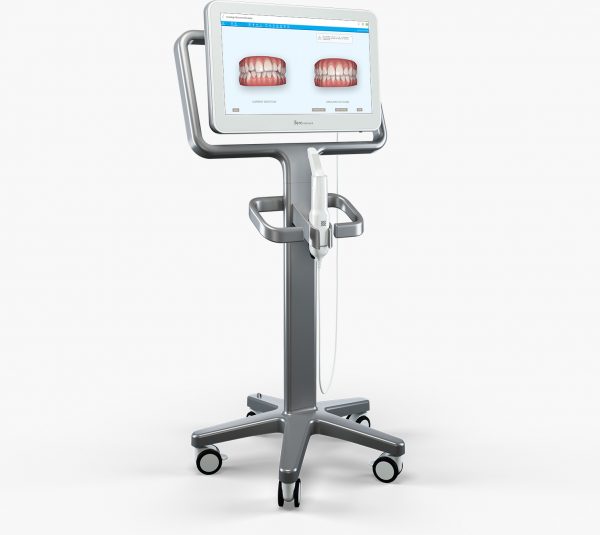
*Our smile visualisation tool is a computer-generated simulation of what your smile may look like after clear treatment. Actual results may vary.
How does it work?
-
Tooth Whitening

What is tooth whitening?
Tooth whitening is the process of lightening the colour of natural teeth with a bleaching product. Here at Bax Dental, we use Boutique whitening products. The formula is safe, easy to use and promises results in 2-3 weeks.
What is the process?
Following on from your dental examination your dentist will use state of the art digital technology to take a scan of your teeth. The dental laboratory can then make whitening trays personalised to you.
You use the whitening gel in your trays every day/night for two/three weeks to see the results.
-
Periodontics
We are pleased to be introducing a dentist with a special interest in Periodontology into the practice.
Harriet qualified from the University of Liverpool in 2012. She provides all aspects of general, and cosmetic dentistry with a strong focus on prevention of disease. Harriet has completed an MSc in Clinical Periodontology and will be accepting referrals for patients with periodontal issues.
Harriet will be available at the practice from May 2024 on Friday afternoons. She will be working alongside all clinicians to offer enhanced periodontal care, without the need of referral to other practices or hospitals.
We hope with treatment and then continued maintenance at home and in the practice, patients will avoid extractions and dentures.
Prices
PERIODONTAL CONSULTATION £250.00 PERIODONTAL REVIEW £150.00 NON-SURGICAL PERIODONTAL TREATMENT from £600.00 PERIODONTAL REGENERATION from £1,000.00 PERIODONTAL OPEN FLAP DEBRIDEMENT from £600.00 PERIODONTAL GRAFTING from £800.00 PERIODONTAL CROWN LENGTHENING / RECONTOURING from £500.00 